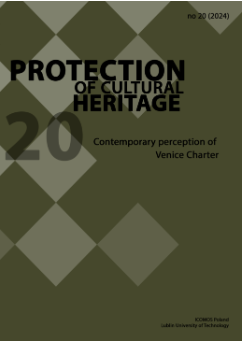ON PRINCIPLES AND OBJECTIVITY
Abstrakt
The character of conservation has changed since the idea of preserving the physical remnants of history became important. Principles derived from this beginning and later on form the basis of what conservation ethics intend today. These principles were never rigid though - yet when it comes to conflict they should be transparent and precise in order to avoid the impression of arbitrariness. Developments continue, and the question where the power of decision should lie is more and more being discussed.
Słowa kluczowe:
Principles, objectivity, democratizationBibliografia
Bacher, E. (Ed.) (1995). Kunstwerk oder Denkmal? Alois Riegls Schriften zur Denkmalpflege. Studien zu Denkmalschutz und Denkmalpflege Band XV, Wien: Böhlau.
Baldini, U. (1978). Teoria del Restauro e Unita di Metodologia. Firenze: Nardini editore.
Baldini, U. (1981). Teoria del Restauro e Unita di Metodologia. Vol. II. Firenze: Nardini editore.
Brandi, C. (1963). Teoria del restauro: lezioni raccolte da L. Vlad. Borrelli, J. Raspi Serra, G. Urbani ... Con una bibliografia generale dell’autore. Roma: Edizioni di Storia e letteratura.
Brandi, C. (1977). Teoria del restauro. Torino: Giulio Einaudi Editore - Piccola Biblioteca Einaudi Ns.
Casazza, O. (1981). Il restauro pittorico nell’unita di metodologia. Firenze: Nardini editore.
ICOMOS 1964. (1964) The Venice Charter: International Charter for the Conservation and Restoration of Monuments and Sites. Retrieved 8 February 2018 from: https://www.icomos.org/charters/venice_e.pdf.
ICOMOS 1994. (1994) The Nara Document on Authenticity. Retrieved 8 February 2018 from: https://www.icomos.org/charters/nara-e.pdf.
Association of Critical Heritage Studies. (2012). 2012 Manifesto. Retrieved 8 February 2018 from: http://www.criticalheritagestudies.org/history/.
Voices of Culture 2017. Brainstorming Report: Towards an Integrated Approach to Cultural Heritage for Europe – Prospectus on „Skills, Training and Knowledge Transfer for Traditional and Emerging Heritage Professions“. Retrieved 8 February 2018 from: http://www.voicesofculture.eu/wp-content/uploads/2017/12/VoC-Skills-and-training-Final-report-with-Appendix1.pdf.
Baldini, U. (1978). Teoria del Restauro e Unita di Metodologia. Firenze: Nardini editore.
Baldini, U. (1981). Teoria del Restauro e Unita di Metodologia. Vol. II. Firenze: Nardini editore.
Brandi, C. (1963). Teoria del restauro: lezioni raccolte da L. Vlad. Borrelli, J. Raspi Serra, G. Urbani ... Con una bibliografia generale dell’autore. Roma: Edizioni di Storia e letteratura.
Brandi, C. (1977). Teoria del restauro. Torino: Giulio Einaudi Editore - Piccola Biblioteca Einaudi Ns.
Casazza, O. (1981). Il restauro pittorico nell’unita di metodologia. Firenze: Nardini editore.
ICOMOS 1964. (1964) The Venice Charter: International Charter for the Conservation and Restoration of Monuments and Sites. Retrieved 8 February 2018 from: https://www.icomos.org/charters/venice_e.pdf.
ICOMOS 1994. (1994) The Nara Document on Authenticity. Retrieved 8 February 2018 from: https://www.icomos.org/charters/nara-e.pdf.
Association of Critical Heritage Studies. (2012). 2012 Manifesto. Retrieved 8 February 2018 from: http://www.criticalheritagestudies.org/history/.
Voices of Culture 2017. Brainstorming Report: Towards an Integrated Approach to Cultural Heritage for Europe – Prospectus on „Skills, Training and Knowledge Transfer for Traditional and Emerging Heritage Professions“. Retrieved 8 February 2018 from: http://www.voicesofculture.eu/wp-content/uploads/2017/12/VoC-Skills-and-training-Final-report-with-Appendix1.pdf.
Baatz, W. (2019). ON PRINCIPLES AND OBJECTIVITY. Ochrona Dziedzictwa Kulturowego, (8), 9–14. https://doi.org/10.35784/odk.1023
Statystyki
Abstract views: 259PDF downloads: 200








